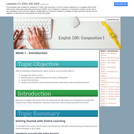
Leeward Community College online 16 week ENG 101 OER course.
- Subject:
- English Language Arts
- Material Type:
- Full Course
- Provider:
- Leeward Community College
- Date Added:
- 02/11/2017

Leeward Community College online 16 week ENG 101 OER course.

This course is the second part of the year-long sequence of college composition. This class is part of your general education and is required for transfer. You will continue to learn to write essays this semester, but our focus will shift from persuasive writing to analytical writing and research. We will use literary texts primarily as the basis for that analysis. I also focus on texts that are related to health occupations in this course.

Extensive critical reading and writing about texts. Emphasis on fluency in critical writing. Includes research skills and writing a critical, documented essay.
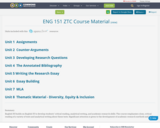
English 151 builds on English 111 to develop
students’ critical reading, analytical writing, and academic research skills. The course emphasizes close, critical reading of a variety of texts and analytical writing about these texts. Significant attention is given to the development of academic research methods and skills.

Instruction in writing compositions from personal, reflective, and argumentative perspectives.
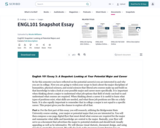
This First Year Writing assignment builds on narrative skills and introduces students to informational and argumentative writing using minimal primary and secondary research as well as drawing on elements on visual rhetoric.
So far this semester you have reflected on the potential career(s) you are interested in and why you are in college. Now you are going to widen your scope to learn about the major disciplines of humanities, physical sciences, and social sciences that liberal arts courses make up and build on that knowledge to take a look at your possible major and career more specifically. It is important when thinking about a major to understand what job options that field of study can lead to and understand what courses are required. When thinking about a career it is useful to learn what types of positions exist, what skills are needed, and what those job positions are like on a daily basis. It is also equally important to remember that in college a major is not equal to a specific career. This project gives you the chance to explore all of that.
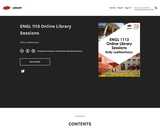
This resource is used to provide library instruction for introductory undergraduate composition courses.
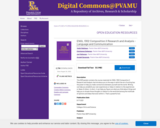
This OER packet contains the course materials for ENGL 1302 Composition II Research and Analysis that introduce you to the ways in which the act of writing has the power to help you make connections between yourself and the world. Writing can help you establish your own experiences or ideas in relation to the experiences or ideas of others. In short, it can help you figure out what you think about things and help you to situate those thoughts in relation to the world and among the multitude of opinions and ideas that exist within it. That’s a powerful tool.

This course covers the fundamental concepts that determine the electrical, optical, magnetic and mechanical properties of metals, semiconductors, ceramics and polymers. The roles of bonding, structure (crystalline, defect, energy band and microstructure) and composition in influencing and controlling physical properties are discussed. Also included are case studies drawn from a variety of applications: semiconductor diodes and optical detectors, sensors, thin films, biomaterials, composites and cellular materials, and others.

Space is one of the seven basic building blocks of art along with Line, Form, Shape, Value, Color, and Texture. Using site specific art as a starting point, we highlight the techniques that artists use to control and manipulate space in their work.

Value is one of the seven basic building blocks of art along with Line, Form, Shape, Color, Space, and Texture. Through the lens of black and white photography, we look at how artists produce value scales and contrast, and how different kinds of lines change the way we perceive depth and space. Learn how different values can invoke different emotions in this video.

Welcome to ENG 101- College Composition I!This is the first half of the yearlong composition sequence at Yavapai College. We will be focusing in this class on persuasive writing skills. This is an 8-week class. That means that it is fast-paced and you will have assignments due two days a week: Mondays and Thursdays. You can expect to spend around 15 hours per week on average on course work.

This is a textbook for an Argument and Rhetorical Modes composition class at the community college level.
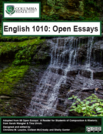
This is a compilation of open essays to supplement an argument and rhetoric class.
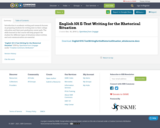
Introduction to academic writing and research focuses on preparing students for writing later in their college education and their post-graduation career path.
The skills learned in this course will help prepare the student for different types of situations where written and oral communication are essential.

English 101 is an introductory composition course, designed to improve your skills in expository and persuasive writing; the writing you will be doing in other courses in college and in many jobs. Sometimes this kind of writing is called transactional writing because it’s used to transact something—inform and (often) persuade a reasonably well-educated audience; conduct business; and evaluate, review, or explain a complex process, procedure, or event. The idea of this course is to develop your writing skills in conjunction with topics that interest you. This course focuses on the importance of reading and writing (more largely education in general) and how we can use those tools to help within our communities.

During this class, we will be investigating the basic question: “What is literature?” What does literature mean to you? How do we define literature? What is counted as literature and why? What does literature have to do with popular culture? Does literature have value in today’s society? How does literature fit into our modern lives? Is literature important anymore? Why do we need (or not need) literature? How should literature be approached in schools? How have different concepts/ideas been portrayed in literature throughout history? What is canonical literature? Why does a lot of canonical literature reflect limited points of view? The idea of this course is to develop your writing skills in conjunction with topics related to literature that interests you. This semester we will be focusing our course on the importance of reading and writing (more largely education in general) and how we can use those tools to think and write critically about the things we read.
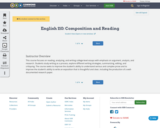
This course focuses on reading, analyzing, and writing college-level essays with emphasis on argument, analysis, and research. Students study writing as a process, explore different writing strategies, summarizing, editing, and critiquing. The course seeks to improve the student’s ability to understand serious and complex prose and to improve the student’s ability to write an exposition that is thoughtful and clear, including the production of a well-documented research paper.
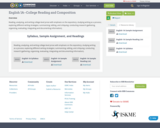
Reading, analyzing, and writing college-level prose with emphasis on the expository; studying writing as a process; exploring different writing strategies; summarizing; editing, and critiquing; conducting research (gathering, organizing, evaluating, integrating and documenting information).
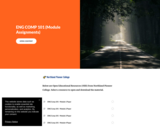
The five paper assignments this collection guide students from personal writing to academic writing, and from writing with a provided source through finding and citing general sources and scholarly sources to stake out a position.